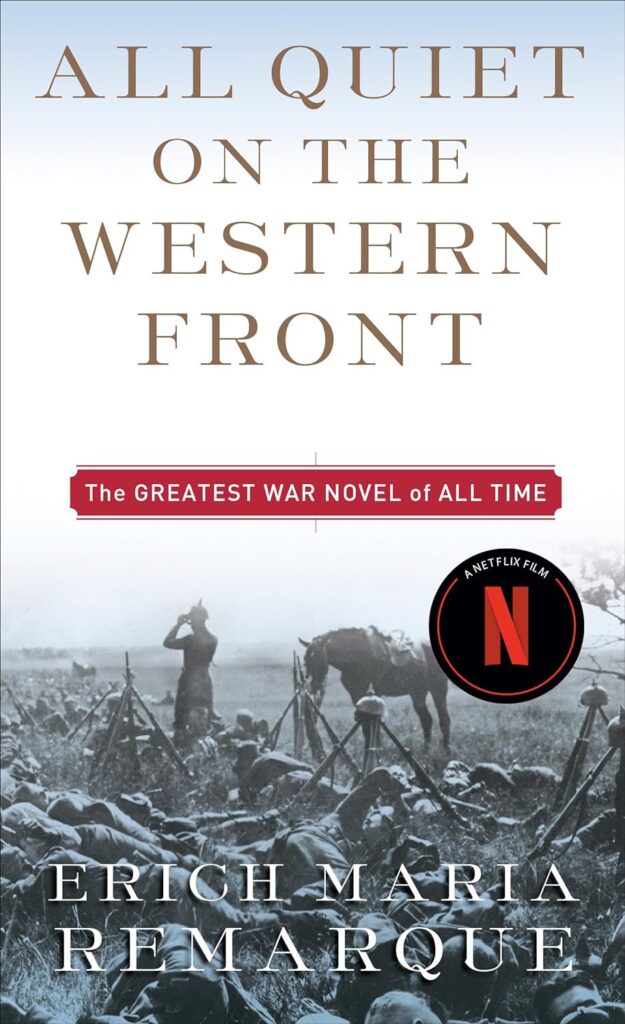Erich Maria Remarque’s All Quiet on the Western Front has haunted and fascinated readers since its publication in 1928. If you’ve ever wondered why this book continues to captivate new generations, you’re not alone. For me, diving into this classic was like stumbling into a powerful storm—one that leaves you breathless and awed. So what makes this novel stand out, even decades after its release? Let’s dive into the elements that make this book not just good, but unforgettable.
1. The Raw Portrayal of War
From the first page, All Quiet on the Western Front grips you with a raw and unfiltered portrayal of World War I. Remarque doesn’t just describe the battlefields; he immerses you in the mud, the fear, and the chaos. The way he writes about the war is personal and visceral. It’s not about the glory or the strategy; it’s about the human cost. As I read, I felt like I was walking alongside the soldiers, feeling their fears and witnessing their struggles firsthand.
The novel’s power lies in its ability to convey the disillusionment of the soldiers. Remarque takes you beyond the heroic narratives of war that you might have heard and shows you the grim reality. The detailed descriptions of trench warfare, the constant threat of death, and the psychological toll on the soldiers are portrayed in a way that’s both haunting and deeply compelling. The way he portrays the mental and emotional scars of war is something that sticks with you long after the pages are turned.

Book Review: All Quiet on the Western Front Book Summary: What You Need to Know
2. The Depth of Characterization
What makes All Quiet on the Western Front more than just a war story is its rich character development. Paul Bäumer, the protagonist, is not just a soldier; he’s a young man grappling with the loss of his innocence. Remarque takes the time to explore Paul’s inner world—the hopes, fears, and dreams that conflict with the brutal reality of war. This deep dive into Paul’s psyche makes his experiences and his suffering all the more poignant.
The secondary characters are just as fleshed out. You meet a diverse group of soldiers, each with their own backstory and personality. They’re not just names; they’re people who come alive through Remarque’s writing. You get to see their friendships, their fears, and their eventual resignation to the horrors around them. It’s this depth that allows you to connect with them on a personal level, which makes their fates even more impactful.
3. The Philosophical Undertones
Another aspect that makes All Quiet on the Western Front stand out is its philosophical depth. The novel isn’t just a recounting of events; it’s a meditation on the nature of war and humanity. Remarque uses Paul’s experiences to explore larger questions about life, death, and the meaning of it all. The philosophical reflections are seamlessly woven into the narrative, giving you something to ponder as you read.
Remarque’s portrayal of the futility of war is particularly striking. The novel challenges the traditional glorification of warfare and instead presents it as a senseless and destructive force. This critical perspective is not just thought-provoking but also encourages readers to question the narratives that society often promotes about war and heroism.
4. The Impact of Language and Style
Remarque’s writing style is another key element that makes this book so powerful. His prose is straightforward yet evocative. He doesn’t need flowery language or elaborate descriptions to convey the horrors of war; his simple, direct style is often more effective. The way he describes scenes is stark and immediate, creating a sense of urgency and immersion.
The language in All Quiet on the Western Front is unpretentious yet profound. Remarque’s ability to express complex emotions and situations in such an accessible way is a testament to his skill as a writer. The contrast between the simplicity of the language and the complexity of the themes makes the novel both approachable and deeply resonant.
5. The Lasting Relevance
Even though All Quiet on the Western Front is set in the aftermath of World War I, its themes are timeless. The novel speaks to the universal experiences of fear, loss, and the search for meaning in the face of suffering. It resonates with anyone who has ever faced adversity or grappled with the darker aspects of human nature.
The relevance of this book continues because it addresses fundamental aspects of the human condition. Whether you’re reading it as a teenager or an adult, the novel’s exploration of the impact of war and the quest for understanding remains profoundly relevant. The questions it raises about the nature of conflict and the essence of humanity are as pertinent today as they were nearly a century ago.
In a world that often seems distant from the trenches of World War I, All Quiet on the Western Front brings a piece of that reality into our lives. It forces us to confront the harsh truths of war and its effects on those who live through it. The novel’s power lies in its ability to make these experiences feel immediate and personal, ensuring that the story continues to resonate with each new reader.
So, what do you think? How do you see the relevance of this classic novel in today’s world?




